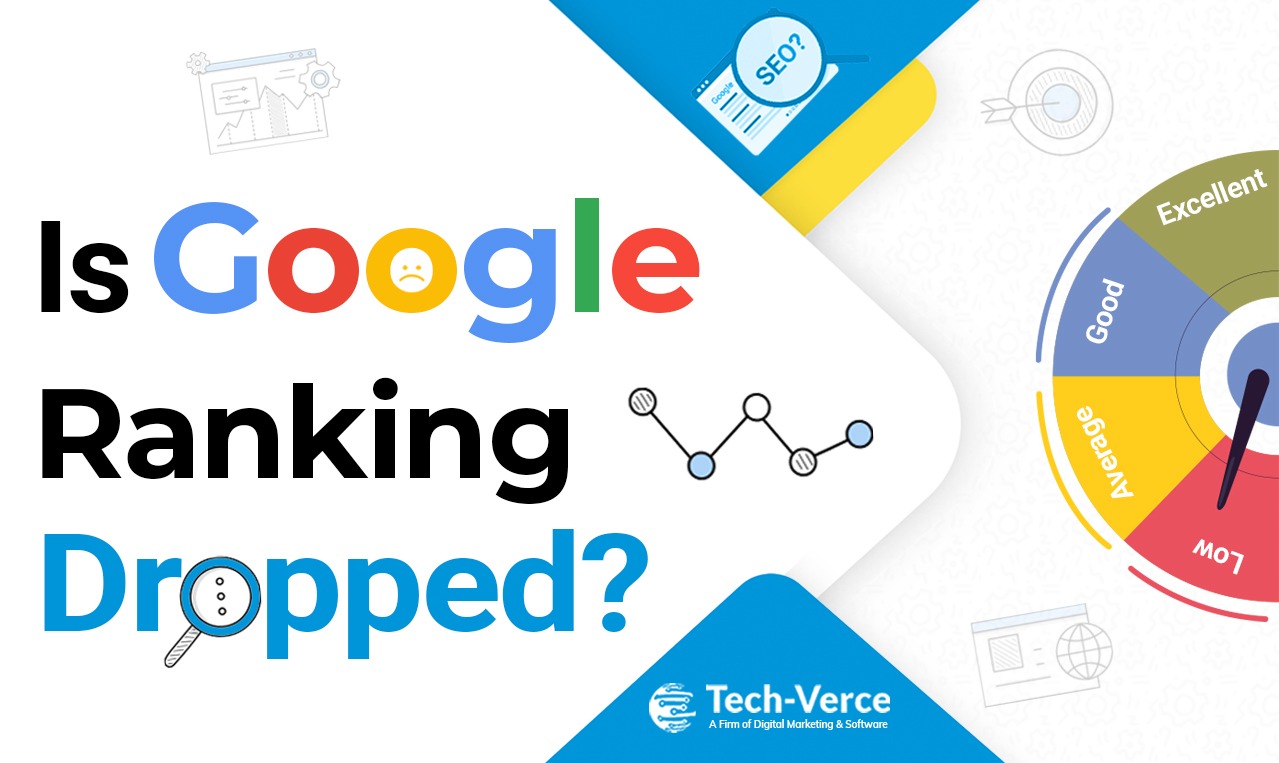Blogs
Is Google Rank dropped? How to recover your Google Ranking Back

Is Google Rank dropped? How to recover your Google Ranking Back
What Dropped Your Google Ranking? First, let’s look at some possible reasons that your Google ranking dropped. You made a mistake with your optimization - When you optimize your website for search engines, you’re trying to make sure that Go
How to Bring your Google Ranking Back
Google’s search results are constantly changing. That means your website may appear on page one of the search results one day and not the next. If you’re wondering why my google ranking dropped – it could be a result of recent Google updates or fluctuations that occur regularly. Google’s search algorithm is updated frequently to filter out irrelevant, spammy, or low-quality websites so users can find the sites they’re searching for more easily. Search engine optimization (SEO) best practices change over time as well. Google responds to changes in user behavior and usage patterns by making adjustments to its search algorithms, which essentially means that what works to rank high today might not work tomorrow.
What Dropped Your Google Ranking?
First, let’s look at some possible reasons that your Google ranking dropped. You made a mistake with your optimization - When you optimize your website for search engines to rank your website in Google by SEO services NewYork, you’re trying to make sure that Google will be able to find and understand your content. If you mistyped a keyword or overused a keyword, for example, or if your description is stuffed with too many links, Google might think you’re trying to trick it and lower your ranking as a result. Your link profile changed - Your link profile refers to all the websites that link to you and includes links from social media, blogs, press releases, forums, and more. A big part of Google’s algorithm is trying to determine the quality of websites. If you get a lot of low-quality links, that could result in a lower ranking. You lost significant traffic - If a lot of people are visiting your site but they’re not clicking on your search engine result, it could indicate that they’re not satisfied with what they find when they get there. That could lead Google to lower your ranking.
Google Algorithm Change
Each year, Google releases a new algorithm update, and 2018 is no different. In 2018, there were three main algorithm updates – one in March, one in May, and one in July. As a website owner, you need to be aware of these algorithm updates to make sure your website doesn’t see a drop in traffic. For example, the May update was focused on mobile-friendliness, so if you have a non-mobile-friendly site, you’re likely to see a drop in traffic. The March update was designed to target low-quality content, so if your site has a lot of low-quality content, you may see a drop in traffic as a result. The July update was designed to affect local businesses, so if your site focuses on local customers, you may have been affected by this update.
Google’s core ranking factors
- Authority: How trustworthy is your website and brand? - Relevance: Is your content related to the topic? - Trust: How much does your content match what users are looking for? - Freshness: When was the content published? - Originality: How unique is your content? - Engagement: Do readers spend time on your site? - Words: How many words are on each page? - Distribution: Where are you distributing your content? Another important thing to note is that Google’s algorithm is constantly being updated to provide the best experience for its users. While experts have found that there are 13 core ranking factors that are always considered, it’s important to remember that they may be weighted differently at different points in time.
Recent Google updates
- Mobile-first indexing - This is a significant change to Google’s algorithm that went into effect in April 2018 and that impacts how your site is indexed. One of the main focuses of this update is making sure that Google’s search results are mobile-friendly. The shift to mobile-first indexing means that Google’s algorithm will primarily use the content found on your mobile site to rank your website in search results, as opposed to using the content on your desktop site. - Rank Brain - Rank Brain is a machine learning system that helps Google’s search algorithm understand the intent behind search queries. While Rank Brain has been around since 2015, experts have found that it made a significant impact on Google’s algorithm in 2018, particularly in the realms of long-tail searches and around questions. - Hummingbird - Hummingbird was an algorithm update that first launched in 2013. However, it continued to play a significant role in Google’s algorithm in 2018. Hummingbird is a core algorithm responsible for Google understanding what words and phrases are meant by a search query. This update helps Google understand the intent behind a search and match it more accurately with the most relevant content.
Keywords and synonyms
Google’s algorithm heavily focuses on the keywords and synonyms that are in your content. If you’re trying to rank for a specific term, it’s important to include that keyword or synonym in your title, description, and throughout your content. However, it’s important to note that including the exact keyword multiple times without variety can result in a penalty. Additionally, be sure to include your keywords in the URL of your page. This can help Google understand what your page is about, which can help you rank higher. Finally, it’s also important to include your keywords in your alt tags and image names. This can help you get more accurate results when users are looking for your content.
Content quality and relevance
Google has always focused on content quality, but it became even more essential in 2018. The algorithm now focuses heavily on the quality of your content and how relevant it is to your audience’s search terms. One of the easiest ways to do this is to go back to your keyword research and use those terms and phrases within your content. To make sure that you’re using the language of your audience, be sure to conduct your research using Google Autocomplete. This will allow you to see what terms people are searching for. Once you have your content created, make sure you’ve edited and proofread it thoroughly. This can help you avoid any mistakes that might lead Google to think your content is low-quality.
User behavior
If you’ve been monitoring your website, you may have noticed that more people are visiting your site via their mobile devices. This is a sign that more people are using Google on the go. If this is happening to your audience, it’s important to ensure that your website is mobile-friendly. Google also pays close attention to dwell time and user bounce rates. Dwell time refers to the amount of time a person spends on your website after clicking on a result. A high bounce rate can indicate that people don’t find what they’re looking for and then leave quickly. Google wants to showcase the best results and will rank sites with low bounce rates higher.
Website design and development factors
The design and development of your site can have a major impact on your Google ranking. If your site is cluttered, full of ads, or has an unusual design, Google may think you’re trying to manipulate the search results and punish you with a lower ranking. Google pays attention to the following factors when determining the ranking of your website: - Loading speed - A slow-loading website can frustrate visitors and cause them to find another site. Google has made loading speed a core ranking factor and has said that sites that load quickly will rank higher. - Mobile-friendliness - Be sure that your site is mobile-friendly by following best practices and using a responsive design. - Architecture - Make sure that your site’s internal linking makes sense and that it’s easy to navigate.
SEO best practices
If your site has seen a drop in its Google ranking, you might want to check to see if there are any common pitfalls that you’ve fallen into. While every website is different, there are a few factors that can lead to a lower ranking: - It’s not fresh - Your content is stale and out of date. Google wants to promote fresh content, so if your site is full of old, rehashed material, it’s likely to rank lower. - It’s not engaging - If your content doesn’t engage readers, they’re unlikely to share it with others or click on your links. This can hurt your Google ranking. - It’s not accurate - Your content needs to be trustworthy and accurate. If you’ve published false information or included incorrect details, you’ll likely







